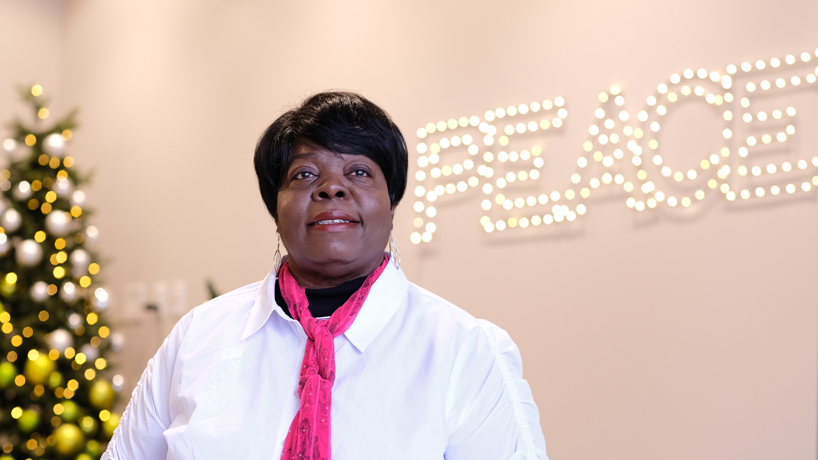
Everlene Falconer went back to school to earn her college degree in 2015 at the age of 60. She was inspired by her grandson, Donovan, who has autism. After earning her Bachelor of Educational Studies degree from UMSL on Dec. 15, Falconer will continue her work at Paraquad with people who have intellectual or developmental disabilities. (Photo by August Jennewein)
Donovan is 12 years old. He is enthralled by trains and buses. He’s not a very strong swimmer, but he still loves to play in the water. He has an exceptional memory, he is a whiz building structures with LEGO blocks and has already penned a 35-page book, complete with illustrations.
Donovan has also been diagnosed with autism. His grandmother, Everlene Falconer, has seen firsthand what a struggle it is for him to thrive in a world that doesn’t always understand him.
His experiences motivated her to enroll at the University of Missouri–St. Louis in January 2015, at the age of 60. She will graduate from the College of Education on Dec. 15 with a Bachelor of Educational Studies and wants to use her degree to help people with developmental disorders.
Including one 12-year-old who holds a special place in her heart.
“All I’ve thought about was, ‘I’m going to do it for Donovan.’ That was my main focus,” Falconer said. “Donovan is in my mind. Every class I had, my peers that I had, my professors, they can tell you that I don’t talk about anything but Donovan. That’s because he was my inspiration to come here. That’s it.”
This was Falconer’s third time in college. She started as a young adult but didn’t finish. She went back and earned her associate degree from St. Louis Community College–Forest Park in phlebotomy, or drawing blood from patients.
“I was a vampire,” Falconer joked.
She worked for six years at Forest Park Hospital before she and three-quarters of the facility’s staff were laid off in 2010 as a precursor to the hospital shutting down the next year.
Falconer held a variety of jobs – head chef among them – in the years after but found steady employment lacking. She realized how much she enjoyed her interactions with Donovan and decided she wanted to learn how to better assist her grandson and others with developmental disorders.
“It was about how I could best help him throughout his life to function in a world that really does not know how to deal with people with disabilities,” Falconer said. “Going to school at UMSL, the things I was learning, I would come home and practice with my grandchildren. Donovan depends on his grandmother. A lot. That was very important to me, to give him as normal a life as I could.”
Ellen Duncan, who has served as Falconer’s academic advisor, says the UMSL BES program is perfect for students like Falconer who are mulling a career change into the educational field but don’t necessarily want to work in a traditional classroom setting.
The BES degree allows students to take general education courses then branch off into specialties such as early childhood education, exercise science and wellness, parks and museums or youth and adult development. Instead of engaging in the classroom practicum like UMSL’s traditional teacher candidates, BES students serve internships at organizations in their specialty fields.
Falconer served her first internship with UMSL SUCCEED, a post-secondary program for students with intellectual and developmental disabilities, then moved on to Paraquad, an organization that teaches skills for independent living to people with disabilities.
After starting at Paraquad in April, Falconer earned a full-time position there in October.
“It’s really rewarding working with the individuals that I’ve been working with,” Falconer said. “These are individuals where nobody took the time teaching them what they need to learn: how to cook, how to count money, do math, how to operate computers, how to do daily things in their lives, how to read.”
During advising sessions, Duncan has seen the easy dynamic between Falconer and her grandson: how natural she is with him and how well the two get along.
“It’s great to see that really strong relationship and that she wants to carry that level of care into working with people who aren’t her grandkids: She wants to make them all her grandkids,” Duncan said. “It takes a lot of perseverance to come back and get a degree at any age. We just want to be supportive of all of our students, no matter where they are in life so that they can succeed. Does it take a heck of a lot of work on their part? Yes. And we want to be helpful to them so that they can grow and pursue their dreams.”
Falconer has maintained an unwavering focus on her educational goals from the time she enrolled at UMSL, even to the point where it was detrimental to her physical health.
She had a blockage in her heart that required the placement of a stent. Falconer, who has diabetes, says she put off the operation for more than two years before finally addressing the issue.
“I would tell the doctors, ‘I’ve got to go to school. I’ve got to finish out the semester,’” Falconer said. “I put it off until I realized that something was going on and I needed to get it taken care of. I didn’t even think about if there might be consequences to it. I just wanted to finish school.”














